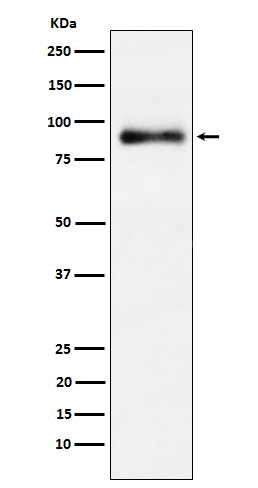
| WB | 咨询技术 | Human,Mouse,Rat |
| IF | 1/20-1/50 | Human,Mouse,Rat |
| IHC | 咨询技术 | Human,Mouse,Rat |
| ICC | 1/50-1/200 | Human,Mouse,Rat |
| FCM | 咨询技术 | Human,Mouse,Rat |
| Elisa | 咨询技术 | Human,Mouse,Rat |
| Aliases | GIG12; HLF2; Kaliocin 1; Lactoferrin; Lactotransferrin; LTF; Neutrophil lactoferrin; Talalactoferrin;;Lactoferrin |
| WB Predicted band size | Calculated MW: 78 kDa ; Observed MW: 85 kDa |
| Host/Isotype | Rabbit IgG |
| Antibody Type | Primary antibody |
| Storage | Store at 4°C short term. Aliquot and store at -20°C long term. Avoid freeze/thaw cycles. |
| Species Reactivity | Human |
| Immunogen | A synthesized peptide derived from human Lactoferrin |
| Formulation | Purified antibody in PBS with 0.05% sodium azide,0.05% BSA and 50% glycerol. |
+ +
以下是3篇关于乳铁蛋白(Lactoferrin)抗体的研究文献摘要简述:
1. **《Detection of Lactoferrin-Specific Antibodies in Human Sera by a Competitive ELISA Method》**
- **作者**: Sánchez et al. (2006)
- **摘要**: 开发了一种竞争性ELISA方法,用于定量检测人血清中乳铁蛋白特异性IgG抗体,探讨其在炎症性肠病(IBD)患者中的表达水平及诊断价值。
2. **《Autoantibodies to Lactoferrin in Sjögren’s Syndrome: Insights into Pathogenesis》**
- **作者**: Bave et al. (2010)
- **摘要**: 研究干燥综合征(Sjögren’s syndrome)患者血清中抗乳铁蛋白自身抗体的存在及其与疾病活动的相关性,提出其可能作为疾病进展的生物标志物。
3. **《Anti-Lactoferrin Antibodies in Colorectal Cancer: Association with Tumor Progression》**
- **作者**: García-Martínez et al. (2020)
- **摘要**: 分析结直肠癌患者血清中抗乳铁蛋白抗体的水平升高现象,发现其与肿瘤分期和转移风险相关,提示其在癌症免疫监测中的潜在作用。
以上文献聚焦于乳铁蛋白抗体的检测技术、自身免疫疾病关联及癌症诊断应用,覆盖基础机制与临床研究。
Lactoferrin antibodies are immunological tools designed to target lactoferrin, a multifunctional iron-binding glycoprotein widely present in mammalian secretions (e.g., milk, saliva, tears) and neutrophil granules. Lactoferrin plays critical roles in innate immunity, including antimicrobial activity, immune regulation, and anti-inflammatory effects. Antibodies against lactoferrin, either polyclonal or monoclonal, are generated using purified lactoferrin as an immunogen, often derived from human, bovine, or other species. These antibodies are essential for studying lactoferrin's expression, localization, and function in biological systems.
In research, lactoferrin antibodies are employed in techniques like ELISA, Western blotting, and immunohistochemistry to quantify lactoferrin levels in bodily fluids or tissues, aiding investigations into infections, inflammatory diseases, and cancer. Structurally, lactoferrin's conserved regions across species allow cross-reactive antibodies, while variable epitopes enable species-specific detection. Clinically, lactoferrin antibodies help monitor conditions like inflammatory bowel disease, where fecal lactoferrin serves as a biomarker. They also support therapeutic development, such as evaluating lactoferrin-based antimicrobial agents or drug delivery systems.
Challenges include ensuring specificity due to lactoferrin's homology with other transferrin family proteins. Recent advances focus on engineering high-affinity recombinant antibodies for diagnostic and therapeutic applications, reflecting lactoferrin's growing relevance in immunology and biomedicine.
×